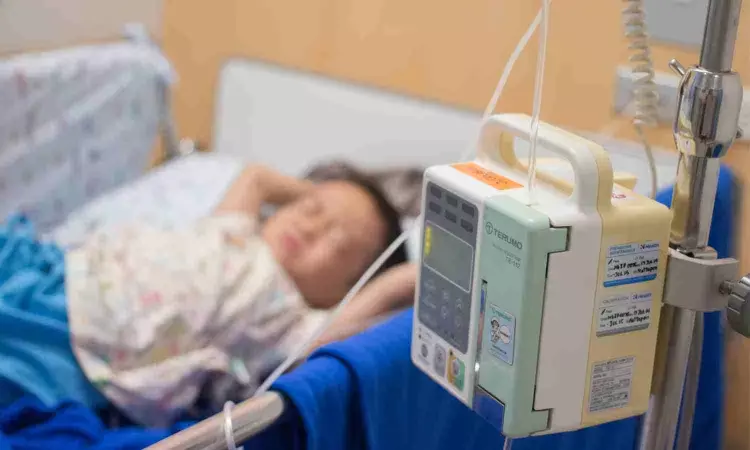- Home
- Medical news & Guidelines
- Anesthesiology
- Cardiology and CTVS
- Critical Care
- Dentistry
- Dermatology
- Diabetes and Endocrinology
- ENT
- Gastroenterology
- Medicine
- Nephrology
- Neurology
- Obstretics-Gynaecology
- Oncology
- Ophthalmology
- Orthopaedics
- Pediatrics-Neonatology
- Psychiatry
- Pulmonology
- Radiology
- Surgery
- Urology
- Laboratory Medicine
- Diet
- Nursing
- Paramedical
- Physiotherapy
- Health news
- Fact Check
- Bone Health Fact Check
- Brain Health Fact Check
- Cancer Related Fact Check
- Child Care Fact Check
- Dental and oral health fact check
- Diabetes and metabolic health fact check
- Diet and Nutrition Fact Check
- Eye and ENT Care Fact Check
- Fitness fact check
- Gut health fact check
- Heart health fact check
- Kidney health fact check
- Medical education fact check
- Men's health fact check
- Respiratory fact check
- Skin and hair care fact check
- Vaccine and Immunization fact check
- Women's health fact check
- AYUSH
- State News
- Andaman and Nicobar Islands
- Andhra Pradesh
- Arunachal Pradesh
- Assam
- Bihar
- Chandigarh
- Chattisgarh
- Dadra and Nagar Haveli
- Daman and Diu
- Delhi
- Goa
- Gujarat
- Haryana
- Himachal Pradesh
- Jammu & Kashmir
- Jharkhand
- Karnataka
- Kerala
- Ladakh
- Lakshadweep
- Madhya Pradesh
- Maharashtra
- Manipur
- Meghalaya
- Mizoram
- Nagaland
- Odisha
- Puducherry
- Punjab
- Rajasthan
- Sikkim
- Tamil Nadu
- Telangana
- Tripura
- Uttar Pradesh
- Uttrakhand
- West Bengal
- Medical Education
- Industry
Common viruses trigger most cases of intussusception in children, suggests study

The research, led by Murdoch Children’s Research Institute (MCRI) and published in Clinical Infectious Diseases, found during the COVID-19 lockdowns hospital admissions for intussusception, a medical emergency involving obstruction of the intestine, among young children significantly decreased.
For the study, 12 years of data was analysed across Victoria, NSW and Queensland. A total of 5,589 intussusception cases were recorded between January, 2010 and April, 2022. Of those, 3,179 were children under the age of two.
During the lockdown periods, Victoria and NSW experienced a decline in hospital admissions for intussusception among children under two by 62.7 per cent and 40.1 per cent, respectively. The rate of intussusception cases has now returned to normal levels.
MCRI and Monash University researcher Dr Ben Townley said the magnitude of the decline supported that common respiratory diseases such as colds, the flu and respiratory syncytial virus (RSV), were behind a significant proportion of intussusception cases.
“Reductions in intussusception hospital admissions were seen in all age groups, however most occurred in children less than two years of age,” he said.
“Intussusception is the leading cause of acute bowel obstruction in infants and young children and without prompt diagnosis and management, can be fatal.
“Countries with prolonged COVID-19 lockdowns and suppression strategies saw reductions in common respiratory viruses, which influenced the drop in intussusception admissions.”
Victoria experienced the greatest lockdown duration, with Melbourne having six lockdown periods, for a total of 263 days. Greater Sydney had 159 days and Brisbane had 18 days in lockdown.
MCRI Professor Jim Buttery said the decrease in intussusception cases was greater than expected given previous research into the causes of the condition.
“Our analysis found commons viruses play a larger role than previously recognised in triggering intussusception,” he said. Infectious triggers were thought to comprise only a minority, about 30 per cent, of cases.”
Professor Buttery said the findings raised the possibility that emerging vaccines like the new RSV vaccines may help prevent intussusception.
“When a new vaccine against common childhood respiratory viruses is introduced, we may find there are some unexpected benefits, like protecting more children from intussusception,” he said. We last saw this in 2007, when introducing the rotavirus vaccine against gastroenteritis, also reduced febrile convulsions in young children.”
Reference:
Benjamin Townley, Deniz Akin, Gerardo Luis Dimaguila, Rana Sawires, Gonzalo Sepulveda Kattan, Sebastian King, Julie Bines, Nicholas Wood, Stephen Lambert, Jim Buttery, Exploring the Infectious Contribution to Intussusception Causality Using the Effects of Coronavirus Disease 2019 Lockdowns in Australia: An Ecological Study, Clinical Infectious Diseases, 2024;, ciae084, https://doi.org/10.1093/cid/ciae084.
Dr Kamal Kant Kohli-MBBS, DTCD- a chest specialist with more than 30 years of practice and a flair for writing clinical articles, Dr Kamal Kant Kohli joined Medical Dialogues as a Chief Editor of Medical News. Besides writing articles, as an editor, he proofreads and verifies all the medical content published on Medical Dialogues including those coming from journals, studies,medical conferences,guidelines etc. Email: drkohli@medicaldialogues.in. Contact no. 011-43720751


